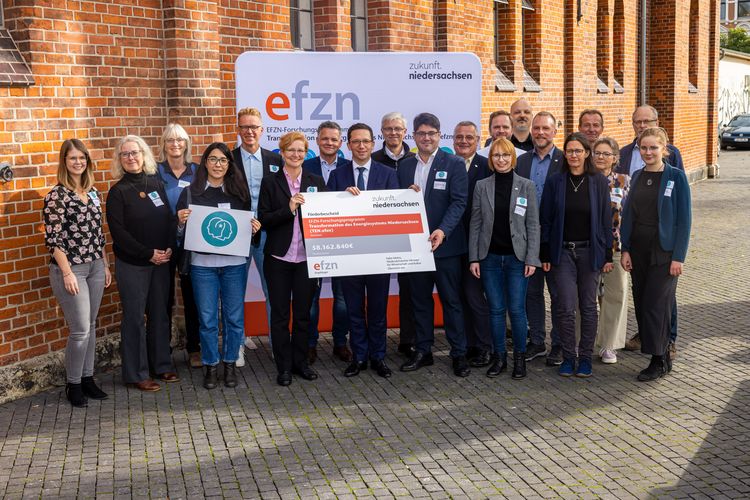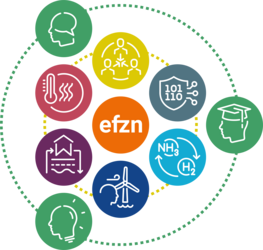Transformation of the Lower Saxony energy system (TEN.efzn)
Head:
Prof. Dr. Klaus Fichter
Facts
Participating research partners:
- Technische Universität Braunschweig
- Technische Universität Clausthal
- Georg-August-Universität Göttingen
- Gottfried Wilhelm Leibniz Universität Hannover
- Carl von Ossietzky Universität Oldenburg
Together with:
- Deutsches Zentrum für Luft- und Raumfahrt Institut für Technische Thermodynamik (DLR-TT)
- Deutsches Zentrum für Luft- und Raumfahrt Institut für Vernetzte Energiesysteme (DLR-VE)
- ForWind - Zentrum für Windenergieforschung
- Fraunhofer-Institut für Windenergiesysteme (IWES)
- Helmholtz-Zentrum Hereon
- Hochschule für angewandte Wissenschaft und Kunst Hildesheim/Holzminden/Göttingen (HAWK)
- Institut für Solarenergieforschung GmbH Hameln (ISFH)
- LIAG-Institut für Angewandte Geophysik (LIAG)
- OFFIS e. V. (OFFIS)
- Physikalisch-Technische Bundesanstalt Braunschweig (PTB)
- Soziologisches Forschungsinstitut (SOFI) e.V. an der Georg-August-Universität Göttingen
- Steinbeis-Innovationszentrum energieplus (siz)
- Universität Vechta (UV)
Funding amount:
58,2 Mio. €
Funding period:
5 years (2024-2029)
You can find more information on the research program's website—click here.
Sponsored by:
Niedersächsisches Ministerium für Wissenschaft und Kultur (MWK) und VolkswagenStiftung aus dem Programm zukunft.niedersachsen
Funding period: 5 years (2024-2029)


Transformation of the Lower Saxony energy system (TEN.efzn)
Research programme to massively strengthen and expand interdisciplinary, cross-location energy research in Lower Saxony
More than 180 scientists are working together with 18 research partners from 16 universities, universities of applied sciences and research institutions in Lower Saxony in the "Transformation of Lower Saxony's Energy System" (TEN.efzn) research programme. Over the next five years, innovative solutions for the energy system of the future will be researched. Together with partners from industry and science, practice-orientated approaches will be developed that transcend local and disciplinary boundaries.
A detailed description of the research programme can be found on the official website here.
What is the role of the Adjunct Professorship for Innovation Management and Sustainability?
As one of the EFZN locations, Carl von Ossietzky University Oldenburg plays a central role in this network. The team at the Chair of Innovation Management and Sustainability, led by Prof. Dr. Klaus Fichter, is active here. Prof. Fichter also serves as the scientific director of the EFZN Transfer module and is responsible for the management and project coordination of the EFZN Academy.
The PIN team is represented in key areas of the program:
- Innovation Area 1: Foundations for successful transfer work
- TP I.1: Best practice analysis of transfer work and development of the EFZN transfer barometer
- TP I.2: Analysis of innovation and diffusion paths in the field of energy technologies
- TP I.3: Data-based approaches and impact forecasting for energy start-ups
- TP I.1: Best practice analysis of transfer work and development of the EFZN transfer barometer
- Innovation Area V (EFZN Academy) – Development of cross-cutting and networked offerings
- TP V.2: Challenge-based learning and co-innovation processes
- TP V.2: Challenge-based learning and co-innovation processes
- Innovation Area VI (EFZN Academy) – Cross-cutting tasks and consolidation
- TP VI.4: Scientific management and coordination
- TP VI.4: Scientific management and coordination
- Innovation Area VII (EFZN Innovation) – Use and development of existing transfer formats and services
- TPVII.1 Use and development of existing transfer formats
Project objectives
- Accelerating the energy transition: By increasing the knowledge of those involved in implementation and promoting greater acceptance in society, we are making a significant contribution to the transformation of the energy system.
- Efficient transfer structures: We create innovative approaches to effectively transfer research results into politics, business and society.
- Further training for the energy transformation: Specialists and managers are specifically trained to master the challenges of the energy transition.
- Promotion of innovations and start-ups: We increase the number and success of technical and social energy innovations and support new business start-ups.
- Global visibility: Lower Saxony's energy research is recognized worldwide in its field.
Overview of the research platforms
The six research platforms are closely networked and specifically geared toward the strengths of energy research in Lower Saxony. Their interdisciplinary focus, combining technology, natural sciences, and social sciences, creates space for innovative research approaches. A newly developed transfer system connects the platforms with each other, facilitates exchange between science, business, politics, and society, and supports the practical implementation of results. This creates impetus for innovation, start-ups, and the training of skilled workers. More than 100 new jobs and targeted qualification programs also strengthen the scientific excellence and future viability of Lower Saxony as a research location.
You can find more information on the research program's website—click here.


